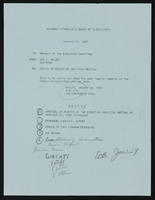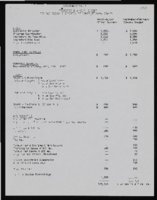Search the Special Collections and Archives Portal
Search Results

Dr. Nancy Leveque interview, July 3, 1975: transcript
Date
Archival Collection
Description
On July 3, 1975, Robin Wright interviewed Doctor Nancy Leveque (b. 1933 in Oak Park, Illinois) about her time living in Las Vegas, Nevada. The interview covers, among many wide-ranging topics, Leveque’s move to and away from Las Vegas, her career as a veterinarian, and the practice she and her then-husband built. Leveque also discusses how the city of Las Vegas has changed-environmentally and socially-, special interest groups and social activities, as well as natural phenomena. Throughout the course of the interview, Leveque provides anecdotes about prominent figures and old Las Vegas traditions, such as Helldorado.
Text

John Fudenberg oral history interview: transcripts
Date
Archival Collection
Description
Oral history interviews with John Fudenberg conducted by Barbara Tabach and Claytee D. White on May 3, 2018 and May 23, 2018 for the Remembering 1 October Oral History Project. In this interview, John Fudenberg, the coroner for Clark County in Las Vegas, Nevada, gives an account of his experience during the October 1, 2017 mass shooting on the Las Vegas Strip and what his role was during the tumultuous days after the shooting. He explains how he and the staff of the coroner's office prepared for the large number of casualties as well as their arrival at the Route 91 Harvest festival venue. Fudenberg speaks of setting up the Family Assistance Center at the convention center and how it supported the community but also aided the coroner's office in gathering information about the deceased and identifying them. Fudenberg discusses the main job of the Coroner's Office during the first week after the shooting, which was to autopsy the bodies and communicate with the families, as well as the Police Department. He also talks about the emotional impact the shooting and its aftermath had on him and his staff members and the wellness program they implemented, of which trauma yoga and meditation had a large impact.
Text

Irene Bustamante Adams oral history interview: transcript
Date
Archival Collection
Description
Oral history interview with Irene Bustamante Adams conducted by Monserrath Hernández and Claytee D. White on May 13, 2020 for the Latinx Voices of Southern Nevada Oral History Project. Irene discusses her personal history, her culture and family traditions, and her previous employment. She also talks about her time in Las Vegas and how she came to be a representative for District 42 in the Nevada Assembly. Subjects discussed include: Migrant Farmworkers; California; Mexican culture; Equal Opportunity Program.
Text

Jay Pleggenkuhle and Daniel Perez oral history interview: transcript
Date
Archival Collection
Description
Oral history interview with Jay Pleggenkuhle and Daniel Perez conducted by Claytee D. White on July 18, 2018 for the Remembering 1 October Oral History Project. In this interview, Jay and Daniel describe their business partnership in a landscaping venture. After the tragic event on October 1, 2017, the pair wanted to do something for the city of Las Vegas, Nevada. Perez suggested that Pleggenkuhle call officials at the City of Las Vegas and propose a healing garden. The City offered a site and the work began, and within 72 hours, a design materialized, volunteers appeared, materials arrived, and the work began. On Friday, the official dedication was held. Pleggenkuhle and Perez share stories of the garden's construction, the generosity of the human spirit, love, and giving back as a city mourns. The two recall that the main oak tree, the Tree of Life, centers the garden and the 58 smaller trees anchor the garden.
Text
John Wittwer Collection on Agriculture in Nevada
Identifier
Abstract
The John Wittwer Collection on Agriculture in Nevada (1898-1972) contains the professional papers and records of John Wittwer in his capacity as an Agricultural Extension agent for the University of Nevada from 1921 to 1954. The records are primarily annual reports containing text, photographs, newspaper clippings, and charts that provide a rich chronicle of the conditions of agriculture and ranching in southern Nevada from 1898 to 1972, with the bulk of the material dating from 1929 to 1955. These conditions span water issues, such as flood control and irrigation, to the general difficulties of sustaining agriculture and viable food production in a desert environment. The reports come from the Agricultural Experiment Stations in Clark and Lincoln counties and most contain both a statistical report and a narrative summary.
Archival Collection

Economic Opportunity Board of Clark County (Nev.): memos, agendas, and meeting minutes
Date
Archival Collection
Description
From the Clark County Economic Opportunity Board Records -- Series I. Administrative. This folder contains memos, agendas and minutes from meetings of the Clark County Economic Opportunity Board from January 1969 through June 1969.
Text
Dina Neal (Nevada Legislature, Senator) oral history interview conducted by Magdalena Martinez and Makada Henry-Nickie: transcript
Date
Archival Collection
Description
From the Lincy Institute "Perspectives from the COVID-19 Pandemic" Oral History Project (MS-01178) -- Elected official interviews file.
Text

Economic Opportunity Board of Clark County (Nev.) financial and budget reports
Date
Archival Collection
Description
From the Clark County Economic Opportunity Board Records -- Series I. Administrative. This folder contains financial memos and reports of the Clark County Economic Opportunity Board from 1964 through 1965.
Text
J. David Hoggard oral history interview
Identifier
Abstract
Oral history interview with J. David Hoggard conducted by Claytee White and unnamed interviewer on various dates in 1997, 1998, and 1999 for the Women's Research Institute of Nevada (WRIN). Hoggard discusses serving in World War II, being transferred to Nellis Air Force Base in 1945, and moving to Las Vegas, Nevada from New Jersey in 1946. He also recalls becoming one of the first African American police officers in Las Vegas, and working in the Clark County School District for 15 years. Hoggard then discusses his involvement with the National Association for the Advancement of Colored People (NAACP), including serving as chapter president for four years.
Archival Collection

